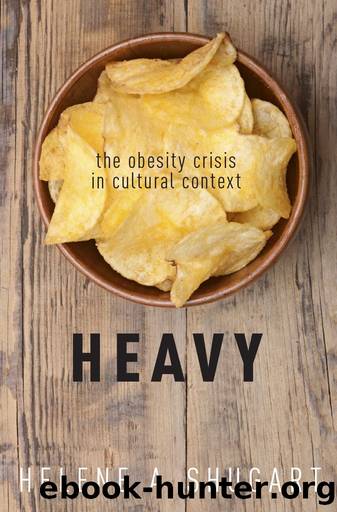Heavy by Shugart Helene A.;

Author:Shugart, Helene A.; [Shugart, Helene A.;]
Language: eng
Format: epub
ISBN: 9780190210625
Publisher: OxfordUP
Published: 2016-09-15T00:00:00+00:00
Excess Autonomy
In very different ways, gender also drives another prominent and visible variation of the resistive narrative response to the conventional account of obesity: defiant decadence. Unlike the fat acceptance variation, this one is fairly straightforwardly and explicitly reactive: that is, it draws itself diametrically and absolutely against not only normative notions of appropriate body size but, especially, official or conventional ideas, practices, or policies designed to ensure that size. While this variation of the resistive narrative echoes the defiance and rebellious that is attached to white Southerners in the cultural narrative of obesity, here it is not attached to a practice of cultural (read: raced/ethnic) identity as opposed to abstract ideals of nation and masculinity, especially at their intersection. This narrative thread is mobilized in excessive consumptionâthe right thereto as well as the practiceâand unapologetically overweight or obese white male bodies.
Defiant decadence is most commonly available in the mainstream as a principle apparent in reactions to attempts to regulate âobesogenicâ foods or practices. Perhaps most notorious among those attempts are former New York City Mayor Michael Bloombergâs various proposals during his tenureâsome successful, some notâto promote healthier eating practices in the city, such as banning the use of trans fats by restaurants; requiring restaurants to post nutritional information regarding their fare; and regulating the size of container in which sugary drinks may be sold. While criticism of these efforts included concerns about disproportionate impact on some (especially poor) populations; arbitrariness of application; and economic impact, the vast majority of conversation in the mainstream revolved around charges of ânanny statism,â even when that characterization was posed as a point of debate. The obvious counterpoint to that model, of course, is the (often hyper-) assertion of individual rights, which in the United States is frequently conflated with nation: again, the notion of individual liberty has long been and continues to be the conceptual foundation of US cultural identity and attendant political and economic philosophies and practices, and it is taken up narratively in this case in extreme and literal ways. Moreover, as perhaps signaled by the disdainful ânannyâ designation to characterize the regulations, reactions are often masculinist in tone, augmenting the already arguably masculinist underpinnings of individualism and autonomy as culturally construed.61
As relevant to the regulation and control of food, thenâthe âgovernmentality of girthâ62âresistance is articulated in the form of the endorsement and/or practice of the right to unlimited consumption: âthose who want a large soda and are prevented from buying one [are] âgoing to display what we call reactanceâa rebelliousness, a determination to circumvent this policy, an attitude of âIâll show them.âââââ63 Certainly, this dynamic is apparent in mainstream accounts of Bloombergâs efforts:
We often hear about how freedom is under attack in the United Statesâthat the government is slowly but surely encroaching on our rights. This may have been true in a gradual sense over the last several decades, but in more recent years we are seeing increased attempts to control, by government decree, our behavior and free will. Since
Download
This site does not store any files on its server. We only index and link to content provided by other sites. Please contact the content providers to delete copyright contents if any and email us, we'll remove relevant links or contents immediately.
Introduction to Social Work Practice : A Practical Workbook by Herschel Knapp(263)
How Data Happened by Unknown(239)
Selective Oxidation Catalysts Obtained by the Immobilization of Iron (III) Porphyrins on Layered Hydroxide Salts by Fernando Wypych Shirley Nakagaki & Guilherme Sippel Machado(218)
Global Health Governance and Commercialisation of Public Health in India by Anuj Kapilashrami Rama V. Baru(191)
Unmasked by Emily Mendenhall(167)
Curing Cancerphobia by David Ropeik(150)
The Pandemic Divide by Gwendolyn L. Wright Lucas Hubbard and William A. Darity Jr(135)
Feminist Global Health Security by Clare Wenham(130)
FALSE PANDEMICS: ARGUMENTS AGAINST THE RULE OF FEAR by Wolfgang Wodarg(128)
Restoring Quality Health Care by Scott W. Atlas(125)
The Making of a Pandemic: Social, Political, and Psychological Perspectives on Covid-19 by John Ehrenreich(123)
Transforming Health Care Scheduling and Access: Getting to Now by Gary Kaplan(122)
Pandemic India by Arnold David;(122)
Oversight and Review of Clinical Gene Transfer Protocols: Assessing the Role of the Recombinant DNA Advisory Committee by Rebecca N. Koehler(119)
Into Africa, Out of Academia by Kwan Kew Lai(109)
Insane Society: A Sociology of Mental Health by Peter Morrall(109)
Risk Communication and Infectious Diseases in an Age of Digital Media by Anat Gesser-Edelsburg Yaffa Shir-Raz(108)
Psychosocial Interventions for Mental and Substance Use Disorders: A Framework for Establishing Evidence-Based Standards by Mary Jane England(106)
The Metropolitan Academic Medical Center by David E. Rogers Eli Ginzberg(105)
